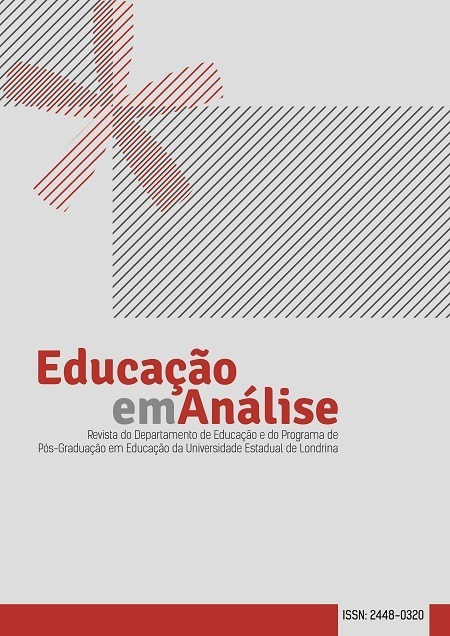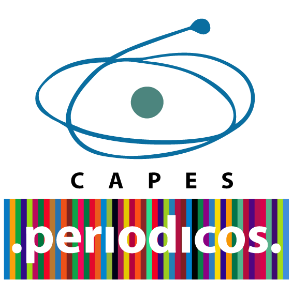Twitter in the interaction between students in virtual learning communities: possibilities for educational practices in the context of cyberculture
DOI:
https://doi.org/10.5433/1984-7939.2023v8n1p135Keywords:
Twitter, Learning, Virtual learning communityAbstract
In virtual environments where interaction among students occurs, communities are often created with the objective of producing and distributing content related to study routines, organization, tips, among other topics. In this sense, the research aimed to investigate to what extent Twitter can be configured as a space for exchanging experiences among students. As a methodological approach, a research was conducted on the virtual learning community of Twitter, in which content analysis was used in the publications, relating them to categories that organize levels of interaction in virtual learning communities, namely: sharing materials, debate, and co-creation of materials. The results point to a use of Twitter as a space in which students can dialogue about topics related to their studies, share materials, and exchange experiences. The results also indicate that the potential of the platform is not fully explored, as it was evident that debate is a scarce element in the investigated community. It is concluded that, although Twitter presents itself as a space with several potentialities, it is necessary for users to appropriate the space more and use it to debate, to co-create more frequently, and to promote more meaningful dialogues.
Downloads
References
ALVES, André Luiz; MOTA, Marlton Fontes; TAVARES, Thiago Passos. O Instagram no processo de engajamento das práticas educacionais: a dinâmica para a socialização do ensino-aprendizagem. Revista Rios Eletrônica, São Francisco, n. 19, p. 25-43, 2018.
BARBOSA, Maria Naftally Dantas; PAIVA,Emanuella Rodrigues Veras da Costa; MORAIS,Paulo Henrique de; GOIS,Adriano Lucena de; MORAIS,Micharlyson Carlos de. O uso da rede social instagram como ferramenta potencializadora do ensino-aprendizagem: estudo de caso do perfil "vai cair no enem". In: CONGRESSO NACIONAL DE EDUCAÇÃO,7., 2020, Campina Grande. Anais [...]. Campina Grande: Realize Editora, 2020. p. 1-12.
BARDIN, Laurence. Análise de conteúdo. São Paulo: Edições 70, 1977. 226 p.
CARNEIRO, Leonardo de Andrade; GARCIA, Leandro Guimarães; BARBOSA, Gentil Veloso. Uma revisão sobre aprendizagem colaborativa mediada por tecnologias. DESAFIOS:Revista Interdisciplinar da Universidade Federal do Tocantins,Tocantis, v. 7, n. 2, p. 52-62, 27 mar. 2020.
CARRASCO, Paola Aldunate; CARRILLO, M. J.; BAZLEY, K.; VERGARA, A.; CONTRERAS, A. Foros virtuales y construcción de conocimientoenprofesionales de lasalud.EnfermeríaUniversitaria, Ciudad de México, v. 14, n. 3, p. 184-190, 2017.
CASTELLS, Manuel. A sociedade em rede. São Paulo: Paz e Terra, 1999. v. 1.
CASTRO, Gisela; BIADENI, Bianca. Studygrams: comunicação, consumo e os novos modos de estudar do estudante conectado. In:CONGRESSO BRASILEIRO DE CIÊNCIAS DA COMUNICAÇÃO, 42., 2019, Belém. Anais [...]. Belém: INTERCOM, 2019. p. 1-15.
COELHO, Willyans Garcia; TEDESCO, Patricia Cabral de Azevedo Restelli. A percepção do outro no ambiente virtual de aprendizagem: presença social e suas implicações para Educação a Distância. Revista Brasileira de Educação, Rio de Janeiro, 2017, v. 22, n. 70, p. 609-624.
CORREIA, Joana Duarte; HENRIQUES, Susana. EaD e eLearning na perspectiva da teoria das redes: uma proposta metodológica. Revista EducaOnline, Rio de Janeiro, v. 15, n. 1, p. 44-58, abr. 2021.
CUNHA, Barbara Kauany de Castro; SOUZA, Daniela de Souza e; CAJAZEIRA, Paulo Eduardo Silva Lins. Cibercultura além do conceito: a televigilância retratada em Jogos Vorazes. In:CONGRESSO DE CIÊNCIAS DA COMUNICAÇÃO NA REGIÃO NORDESTE, 19., 2017, Fortaleza. Anais [...].Fortaleza: Ufca, 2017. p. 1 - 10.
DUTRA, Marlene de Alencar; FERREIRA, Edith Maria Batista; THERRIEN, Jacques; LIMA E SILVA, Joselma Ferreira.Vitual diaspora: process of idetification and belonging in a virtual learning community. Research, Society andDevelopment, Vargem Grande Paulista, v. 9, n. 6, p. e147963572, 2020. DOI: 10.33448/rsd-v9i6.3572.
ELLIS, David; OLDRIDGE, Rachel; VASCONCELOS, Ana. Community and virtual community. Annual Review of Information Science and Technology, White Plains, v. 38, p. 145-186, 2004.
FERNANDES, Raquel Moreira Machado. Studygram: Interação e compartilhamento de processos de ensino-aprendizagem através do Instagram. In:CONGRESSO BRASILEIRO DE INFORMÁTICA NA EDUCAÇÃO, 7., 2018, Fortaleza. Anais [...].Fortaleza: CBIE, 2018, p. 1964-1967.
FROES, Terezinha; CARDOSO, Antônio. Práticas pedagógicas utilizando um ambiente virtual de aprendizagem para construção colaborativa do conhecimento. Pesquisa Brasileira em Ciência da Informação e Biblioteconomia, João Pessoa, v. 3, n. 2, 2008.
GIL, Antonio Carlos. Métodos e técnicas de pesquisa social. 6. ed. São Paulo: Atlas, 2008.
LALUEZA, José Luis; CRESPO, Isabel; CAMPS, Silvia. As tecnologias da informação e da comunicação e os processos de desenvolvimento e socialização. In: COLL, César; MONEREO, Charles. Psicologia da educação virtual: aprender e ensinar com as tecnologias da informação e da comunicação. Porto Alegre: Artmed, 2010. p. 47-65.
LAPA, Andrea; GIRARDELLO, Gilka. Gestão em rede na Primavera Secundarista. In: PORTO, Cristiane; OLIVEIRA, Kaio Eduardo; CHAGAS, Alexandre (org.).Whatsapp e educação: entre mensagens, imagens e sons [online]. Salvador: Ilhéus: EDUFBA: EDITUS, 2017.
MATTAR, João. Tutoria e interação em educação a distância. São Paulo: Cengage Learning, 2012.
MEIRINHOS, Manuel; OSÓRIO, António. Criação de comunidades virtuais de aprendizagem colaborativa para a formação contínua de professores. Revista Internacional de TecnologíasenlaEducación, Espanha, v. 4, n. 1, p. 49-56, 2017.
MORAES, Dirce Aparecida Foletto de; LIMA, Claudia Maria de; SILVA, AnalígiaMiranda da. Avaliação da aprendizagem como mediação pedagógica na formaçãoconceitual de universitários.Revista Ibero-Americana de Estudos em Educação,Araraquara, v. 17, n. 1, p. 0901-0919, mar. 2022. Disponível em:https://periodicos.fclar.unesp.br/iberoamericana/article/view/15814. Acesso em:7nov. 2022.
OLIVEIRA, Isolina; MIRANDA, Branca; BARREIRA, Carlos Manuel Folgado. A construção de comunidades virtuais de aprendizagem na formação de supervisores e líderes pedagógicos. RE@D - Revista de Educação a Distância e Elearning, Lisboa, v. 3 n. 1, p. 19-36, mar. 2020.
PALÁCIO, Maria Augusta Vasconcelos; STRUCHINER, Miriam. Análise do uso de recursos de interação, colaboração e autoria em um ambiente virtual de aprendizagem para o ensino superior na área da saúde. Ciência & Educação, Bauru, v. 22, n. 2, p. 413-430, 2016.
RECUERO, Raquel. Redes sociais na internet. Porto Alegre: Sulina, 2009.
RETAMAR, Hugo Jesús Correa. Facebook como ferramenta de interação extraclasse para aprendizes de língua espanhola. Trabalhos em Linguística Aplicada, Campinas, v. 56, n. 1, p. 97-115, 2017.
RHEINGOLD, Howard. The virtual community: homesteading on the electronic frontier. Cambridge: MIT Press, 1993.
SALVADOR, Daniel Fábio et al. Comunidade virtual aprendizagem para professores de biologia e ciências: avaliação da utilização e desafios. Revista Electrónica de InvestigaciónenEducaciónenCiencias, Buenos Aires, v. 12, n. 1, p. 12-22, 2017.
SILVA, Alexandre José de Carvalho; MARTINS, Ronei Ximenes. Desenvolvimento de uma comunidade virtual de aprendizagem para a inserção da metodologia blendedlearning na educação básica. Revista Brasileira de Aprendizagem Aberta e a Distância, São Paulo, v. 16, p. 95-95, 2017.
TIC KIDS Online Brasil 2021: 78% das crianças e adolescentes conectados usam redes sociais. Cetic.br, São Paulo, 16 ago. 2022. Disponível em: https://cetic.br/pt/noticia/tic-kids-online-brasil-2021-78-das-criancas-e-adolescentes-conectados-usam-redes-sociais/. Acesso em: 26 set. 2022.
TWITTER. Perguntas frequentes de novos usuários. [S. l.]: Twitter, 2022a. Disponível em: https://help.twitter.com/pt/resources/new-user-faq. Acesso em: 17 set. 2022.
TWITTER. Primeiros passos com o Twitter: curta os tweets e demonstre seu apoio. [S. l.]: Twitter, 2022b. Disponível em: https://help.twitter.com/pt/resources/twitter-guide/topics/how-to-get-started-with-twitter/how-to-like-a-tweet-on-twitter-twitter-help. Acesso em: 17 set. 2022.
Downloads
Published
How to Cite
Issue
Section
License
Copyright (c) 2023 Bianca Gomes de Souza, Dirce Aparecida Foletto de Moraes, Analígia Miranda da Silva

This work is licensed under a Creative Commons Attribution-NonCommercial 4.0 International License.
Os artigos publicados na Revista Educação em Análise estão sob a Licença Creative Commons Atribuição 4.0 Internacional, garantindo Acesso Aberto. Deste modo, os autores mantêm os direitos autorais de seus trabalhos e, em caso de republicação, solicita-se que indiquem a primeira publicação nesta revista. Essa licença permite que qualquer pessoa leia, baixe, copie e compartilhe o conteúdo, desde que a devida citação seja feita. Além disso, autoriza a redistribuição, adaptação e criação de obras derivadas em qualquer formato ou meio, incluindo uso comercial, desde que a atribuição à revista seja mantida.
A revista se reserva o direito de efetuar, nos originais, alterações de ordem normativa, ortográfica e gramatical, com vistas a manter o padrão culto da língua e a credibilidade do veículo. Respeitará, no entanto, o estilo de escrever dos autores. Alterações, correções ou sugestões de ordem conceitual serão encaminhadas aos autores, quando necessário.
As opiniões emitidas pelos autores dos artigos são de sua exclusiva responsabilidade.
























